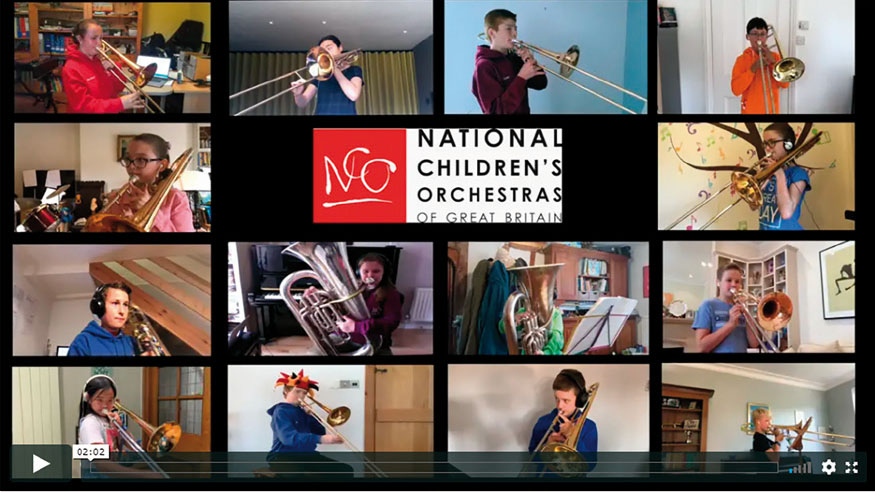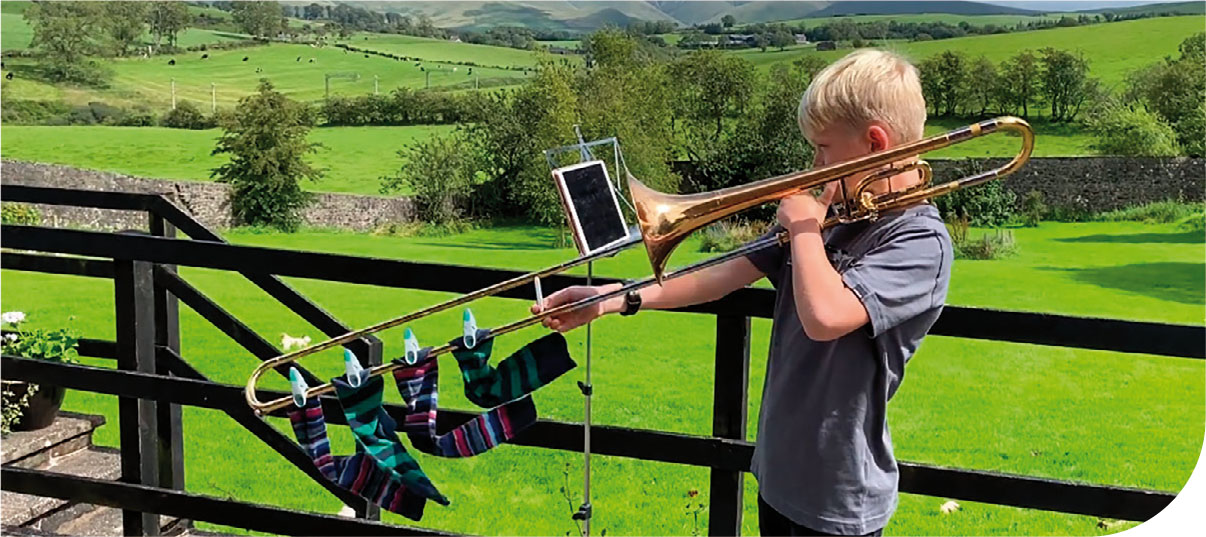
After the Department for Education released strict guidance preventing orchestras from gathering in person, the National Children's Orchestra of Great Britain (NCO) was stopped in its tracks. How can you unite 600 children, aged 7–14, with musical instruments in hand, when you can't meet in person? It seems almost impossible.
However, Sophie Lewis and Catherine Arlidge felt this challenge presented an opportunity for NCO to broaden its horizons and attempt new methods of uniting students. With the vision to ‘be a place where children (and grownups) can truly flourish through music’, the operation was forced to enter the virtual realm, and so NCO Online was born.
An original perspective
Lewis makes it clear that the adventurous decision to create a detailed programme of virtual events was a strange one. ‘From an organisational perspective, we were really careful not to try to emulate what courses normally were’, she says. ‘It was very easy to slip into doing that – it would be a very natural response. But actually, we had a bit of a moment where we thought, is that right?’. The NCO team had an epiphany, she explains: ‘There's lots of stuff you can't do as well virtually, and actually if you try and do it everyone involved will just be a bit sadder that you can't quite do it the same. So, what I think has been most important from an organisational perspective was to pause, and to think deeply about what we wanted to achieve from our online activities.’
The team consulted the children at NCO, their parents, and the vast team of music tutors and pastoral staff to discover what the best method was. After running some surveys and rolling out focus groups, NCO found that children wanted three things: to have fun, to learn some new musical skills, and to meet friends. This sculpted their new virtual space, moulding the programme of events to stay in line with these wishes.
Despite only meeting digitally, Lewis says that the sense of togetherness was stronger than it has been in the past. ‘We've actually got to know the children and their parents and our teams a little better, perhaps, than we would normally. Sometimes we only see them for one week a year, or a parent just drops a child off and then collects them at the end of the week, so it's been a really great way to get to know all of the people involved in NCO in a slightly different way.’

A collaborative Brass project
A new start
Arlidge explains that NCO went on to build a new website for all their online content, for which each child has a secure login and can only see material that is relevant to them. With over 450 live events and roughly 90 staff working on the programme, the operation is huge.
Events have been split into five categories for this year's students:
- Inspiration: Specials guests from the music sector inspire the students to start a career in the arts. Speakers have included Wynne Evans (Mr Go Compare), the composer of Wallace and Gromit Julian Nott, 2018 BBC Young Jazz Musician of the Year Xhosa Cole, and actor, comedian, presenter and writer Stephen Mangan.
- My Instrument: Fun interactive social sessions, mentoring from NCO staff, and tips from performance coach and former GB athlete Claire Bennett. Instrument-specific training from the London Symphony Orchestra for the top two orchestras at NCO.
- Let's Create: A cappella musical post cards, creative sessions, and improvisation sessions with Jonathan James. After the success of the NCO Mambo last year, a multi-track number composed by Ryan Linham is the big project this year, described by Arlidge as a ‘Hollywood number’ that has ‘a march, a waltz, a tango and then a disco’.
- Wellbeing: Workout sessions with former GB athlete Henry Cookey, threading in principles that are essential for musicians.
- Pick N Mix: Orchestra socials, quizzes, escape rooms and task master challenges.
NCO has now also created a Parent Network, where they host Zoom meetings, socials, and webinars on how to support the development of young musicians and maintain their mental wellbeing. Arlidge adds: ‘It's been great to have the time to focus on [the online content] and work out what it really does well. Accelerating our learning as an organisation is a definite bonus that's come out of this time.’ NCO plans to use this platform in the future as an additional supplement to the in-person courses.
Encouraging young musicians to work together and take on responsibility, NCO also runs a mentor scheme that trickles down throughout their students. A partnership with NYO enabled their musicians aged around 17 or 18 to mentor the NCO's oldest players, who are around 13–15 years old. These students then mentor the younger players, around 7–9 years old, creating a chain of young musicians working together, and developing the sense of community surrounding the collective.
Supporting all children
With partnerships from Music Education Hubs, The Nucleo Project, Awards for Young Musicians and more, NCO gained around 200 new students this year, expanding its reach and accessibility. Lewis explains that around 38 per cent of NCO's membership is from Black, Asian and minority ethnic backgrounds, and that around 23 per cent of their students receive financial aid – this is around 130 children, equivalent to a full symphony orchestra. Lewis says: ‘This year has been a real opportunity to develop those partnerships further, to make sure that our membership is as diverse as it can be.’
In terms of classes, Lewis reveals how they maintain student wellbeing: ‘We've taken real care not to have more than about eight to 10 children [per class] because we know that on iPads, for example, you can't see all the boxes, but also because that's more manageable for the staff; it's more intimate. We've given a lot of training to the people running those sessions to ensure the staff are as inclusive as possible. I think it's in the language as well, the way that we are presenting this is that it is for everyone, and it's really fun. We're really mindful to create an environment where children feel very supported.’

NCO student Sammy playing his trombone
Bridging the virtual gap
The secret to consistently engaging young students in activities online is to be as varied in your teaching as possible, claim Lewis and Arlidge. ‘If there's one activity that one child doesn't really get or enjoy, we're moving on quickly all the time. So, it's not like a whole thing on one excerpt that they don't enjoy, and this is as interactive as possible,’ says Arlidge.
Communicating over Zoom can be tricky, but Arlidge explains how NCO bridges this gap: ‘Actually asking [students] to speak in a very unconfrontational way is important. So, “what did you have for breakfast today?” Or “what's your favourite chocolate bar or your favourite bag of crisps?”. If you start to break the ice in the digital space in that way, then people tend to feel more comfortable. So, I think just thinking carefully and being really observant.’
‘You have to be as interactive and varied as possible,’ Lewis agrees. ‘If you can achieve those two things, then I think you're a big step down the road. You have to be more varied than you are in real life because it's two dimensional.’
NCO is hoping to deliver activities in-person again in 2022. They hope to offer a mix of their traditional residential courses, but also other opportunities for regional engagement, and an underlying digital programme. Auditions will open soon, and the team encourages children from the ages of 7–14 to reach out and get involved.
Lewis makes it clear why the team at NCO do the work they do: ‘It's all ultimately about sharing and coming together – whether you do that in a quartet or in an orchestra – that's the joy of it. The bringing together of likeminded people as a community.’








